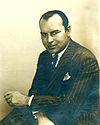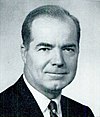Oklahoma's 2nd congressional district
| Oklahoma's 2nd congressional district | |
|---|---|
Interactive map of district boundaries since January 3, 2023 | |
| Representative | |
| Distribution |
|
| Population (2023) | 811,280 |
| Median household income | $51,974[1] |
| Ethnicity |
|
| Cook PVI | R+29[2] |
Oklahoma's 2nd congressional district is one of five United States congressional districts in Oklahoma and covers approximately one-fourth of the state in the east. The district borders Arkansas, Kansas, Missouri, and Texas and includes (in whole or in part) a total of 24 counties.[3] With a Cook Partisan Voting Index rating of R+29, it is the most Republican district in Oklahoma, a state with an all-Republican congressional delegation.[2]
Historically, the district has supported conservative Democrats, and was reckoned as a classic Yellow dog Democrat district. However, the growing Republican trend in the state has overtaken the district since the start of the 21st century. In the last two elections, the Republican presidential candidate has carried it by the largest margin in the state. Urban voters comprise a third of the district.[4]
The district is represented by Republican Josh Brecheen, becoming only the third Republican to hold the seat since 1923. Brecheen was first elected in 2022, following the retirement of five-term Republican incumbent Markwayne Mullin, who was elected to the United States Senate.
Geography
[edit]The district borders Kansas to the north, Missouri and Arkansas to the east, and Texas (along the Red River) to the south. It covers all or part of 26 counties. It includes the remainder of Rogers County (including the county seat of Claremore) that is not included in the 1st district, and then, also, all of the following counties: Adair, Nowata, Craig, Ottawa, Mayes, Delaware, Cherokee, Okmulgee, Muskogee, Sequoyah, Okfuskee, McIntosh, Haskell, LeFlore, Hughes, Pittsburg, Latimer, Coal, Atoka, Pushmataha, McCurtain, Choctaw, Bryan, Marshall and Johnston.[3]
Some of the principal cities in the district include Miami, Claremore, Muskogee, Tahlequah, Okmulgee, McAlester, and Durant.
The northern half of the district includes most of the area of Oklahoma referred to as Green Country, while the southern half of the district includes a part of Oklahoma often referred to as Little Dixie. It contains the majority of lands in the Choctaw Nation and the Cherokee Nation, as well as smaller parts of the Creek and Chickasaw nations.
History
[edit]In the 20th century, the district heavily favored conservative Democratic candidates, being represented in the House only by Democrats from 1923 to 1994. The district's Democratic leanings stem partly from historic migration patterns into the state– the Little Dixie region of the district imported the people and culture of southern states such as Mississippi after Reconstruction.[5] Voter registration in Little Dixie ran as high as 90 percent Democratic in the past.[5] Additionally, Native Americans in the region tend to vote for Democratic candidates and they have helped Democratic candidates win statewide elections.[6]
The district first shifted Republican in electing Tom Coburn in 1994, who vacated the seat due to a self-imposed term limit pledge (he was elected to the United States Senate 4 years later). It was held by conservative Democrats Brad Carson and Dan Boren from 2001 to 2012. Since the 2012 election, the 2nd district has been safely Republican at all levels including the House: it was represented by Markwayne Mullin from 2013. Mullin assumed office as a U.S. Senator in 2023, and was succeeded as the Representative from the 2nd district by fellow Republican Josh Brecheen.
Presidentially, this was the best-performing district for Democrats in the 20th century; Bill Clinton was the last Democratic presidential candidate to win the district, easily carrying it in 1992 and 1996. Since then it has been safely Republican: George W. Bush received 59 percent of the vote in this district in 2004, John McCain received 66 percent of the vote in this district in 2008, and in 2020, Donald Trump won one of the highest percentages for a Republican presidential candidate, winning 76% of the vote to only 22% for the Democratic candidate Joe Biden. Muskogee has produced six representatives, more than any other city in the district. Tahlequah has produced three representatives, the second most of any city in the district.
According to the 2000 U.S. census, the district is 35.51 percent urban, 23.95 percent non-white, and has a population that is 2.40 percent Latino and 1.36 percent foreign-born.[4] The district has a higher percentage of Native Americans than any other congressional district in Oklahoma.[6] Its representative, Josh Brecheen, is one of four Native Americans currently serving in Congress.[7]
Results from recent statewide elections
[edit]Presidential races
[edit]| Year | Results |
|---|---|
| 2000 | Bush 53–47% |
| 2004 | Bush 59–41% |
| 2008 | McCain 66–34% |
| 2012 | Romney 68–32% |
| 2016 | Trump 73–23% |
| 2020 | Trump 76–22% |
Recent election results
[edit]2004
[edit]| Party | Candidate | Votes | % | |
|---|---|---|---|---|
| Democratic | Dan Boren | 179,579 | 65.9% | |
| Republican | Wayland Smalley | 92,963 | 34.1% | |
| Total votes | 272,542 | 100.00% | ||
| Democratic hold | ||||
2006
[edit]| Party | Candidate | Votes | % | |
|---|---|---|---|---|
| Democratic | Dan Boren (Incumbent) | 122,347 | 72.7% | |
| Republican | Patrick K. Miller | 45,861 | 27.3% | |
| Total votes | 168,208 | 100.00% | ||
| Democratic hold | ||||
2008
[edit]| Party | Candidate | Votes | % | |
|---|---|---|---|---|
| Democratic | Dan Boren (Incumbent) | 173,757 | 70.5% | |
| Republican | Raymond J. Wickson | 72,815 | 29.5% | |
| Total votes | 246,572 | 100.00% | ||
| Democratic hold | ||||
2010
[edit]| Party | Candidate | Votes | % | |
|---|---|---|---|---|
| Democratic | Dan Boren (Incumbent) | 108,203 | 56.5% | |
| Republican | Charles Thompson | 83,226 | 43.5% | |
| Total votes | 191,429 | 100.00% | ||
| Democratic hold | ||||
2012
[edit]| Party | Candidate | Votes | % | |
|---|---|---|---|---|
| Republican | Markwayne Mullin | 143,701 | 57.3% | |
| Democratic | Rob Wallace | 96,081 | 38.3% | |
| Independent | Michael G. Fulks | 10,830 | 4.3% | |
| Total votes | 250,612 | 100.0% | ||
| Republican gain from Democratic | ||||
2014
[edit]| Party | Candidate | Votes | % | |
|---|---|---|---|---|
| Republican | Markwayne Mullin (Incumbent) | 110,925 | 70.0% | |
| Democratic | Earl Everett | 38,964 | 24.6% | |
| Independent | Jon Douthitt | 8,518 | 5.4% | |
| Total votes | 158,407 | 100.0% | ||
| Republican hold | ||||
2016
[edit]| Party | Candidate | Votes | % | |
|---|---|---|---|---|
| Republican | Markwayne Mullin (Incumbent) | 189,839 | 70.6% | |
| Democratic | Joshua Harris-Till | 62,387 | 23.2% | |
| Independent | John McCarthy | 16,644 | 6.2% | |
| Total votes | 268,870 | 100.0% | ||
| Republican hold | ||||
2018
[edit]| Party | Candidate | Votes | % | |
|---|---|---|---|---|
| Republican | Markwayne Mullin (Incumbent) | 140,451 | 65.0% | |
| Democratic | Jason Nichols | 65,021 | 30.1% | |
| Independent | John Foreman | 6,390 | 3.0% | |
| Libertarian | Richard Castaldo | 4,140 | 1.9% | |
| Total votes | 216,002 | 100.0% | ||
| Republican hold | ||||
2020
[edit]| Party | Candidate | Votes | % | |
|---|---|---|---|---|
| Republican | Markwayne Mullin (incumbent) | 216,511 | 75.0 | |
| Democratic | Danyell Lanier | 63,472 | 22.0 | |
| Libertarian | Richie Castaldo | 8,544 | 3.0 | |
| Total votes | 288,527 | 100.0 | ||
| Republican hold | ||||
2022
[edit]| Party | Candidate | Votes | % | |
|---|---|---|---|---|
| Republican | Josh Brecheen | 167,843 | 72.4 | |
| Democratic | Naomi Andrews | 54,194 | 23.3 | |
| Independent | "Bulldog" Ben Robinson | 9,635 | 4.1 | |
| Total votes | 231,672 | 100.0 | ||
| Republican hold | ||||
List of members representing the district
[edit]Historical district boundaries
[edit]

See also
[edit]References
[edit]- ^ Center for New Media & Promotion (CNMP), US Census Bureau. "My Congressional District". www.census.gov.
- ^ a b "2022 Cook PVI: District Map and List". Cook Political Report. Retrieved January 10, 2023.
- ^ a b Oklahoma's 2nd District (accessed May 24, 2010).
- ^ a b Representative Dan Boren: District Demographics, That's My Congress (accessed May 11, 2010).
- ^ a b Gaddie, Ronald Keith, "Democratic Party," Encyclopedia of Oklahoma History and Culture Archived May 31, 2010, at the Wayback Machine (accessed May 24, 2010).
- ^ a b "Paying Attention to the Native American Vote". www.pbs.org.
- ^ "Cherokee Nation Honors U.S. Rep. Mullin". Times Record.
- ^ "Oklahoma Secretary of State 2014 General Election". Oklahoma Secretary of State. November 4, 2014. Retrieved January 6, 2015.
- ^ "Official Results – General Election — November 8, 2016". Oklahoma Secretary of State. November 8, 2016. Retrieved December 1, 2016.
- ^ "November 3, 2020 – Official Results". Oklahoma State Election Board.
- ^ "November 8 2022 Oklahoma Official results". results.okelections.us. Oklahoma State Election Board. Retrieved November 9, 2022.
- Martis, Kenneth C. (1989). The Historical Atlas of Political Parties in the United States Congress. New York: Macmillan Publishing Company.
- Martis, Kenneth C. (1982). The Historical Atlas of United States Congressional Districts. New York: Macmillan Publishing Company.
- Congressional Biographical Directory of the United States 1774–present


 French
French Deutsch
Deutsch
















